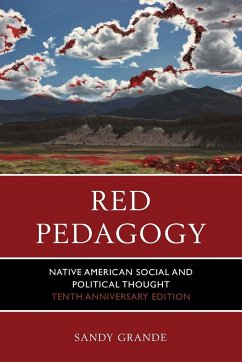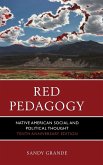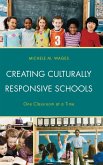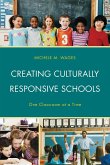- Broschiertes Buch
- Merkliste
- Auf die Merkliste
- Bewerten Bewerten
- Teilen
- Produkt teilen
- Produkterinnerung
- Produkterinnerung
This ground-breaking text explores the intersection between dominant modes of critical educational theory and the socio-political landscape of American Indian education. Grande asserts that, with few exceptions, the matters of Indigenous people and Indian education have been either largely ignored or indiscriminately absorbed within critical theories of education.
Andere Kunden interessierten sich auch für
![Red Pedagogy Red Pedagogy]() Sandy GrandeRed Pedagogy122,99 €
Sandy GrandeRed Pedagogy122,99 €![Transforming Student Travel Transforming Student Travel]() Faye BrennerTransforming Student Travel47,99 €
Faye BrennerTransforming Student Travel47,99 €![Creating Culturally Responsive Schools Creating Culturally Responsive Schools]() Michele WagesCreating Culturally Responsive Schools70,99 €
Michele WagesCreating Culturally Responsive Schools70,99 €![Creating Culturally Responsive Schools Creating Culturally Responsive Schools]() Michele WagesCreating Culturally Responsive Schools38,99 €
Michele WagesCreating Culturally Responsive Schools38,99 €![Multicultural Education in an Age of Globalization Multicultural Education in an Age of Globalization]() Chinaka S. DomnwachukwuMulticultural Education in an Age of Globalization40,99 €
Chinaka S. DomnwachukwuMulticultural Education in an Age of Globalization40,99 €![Multicultural Education in an Age of Globalization Multicultural Education in an Age of Globalization]() Chinaka S. DomnwachukwuMulticultural Education in an Age of Globalization75,99 €
Chinaka S. DomnwachukwuMulticultural Education in an Age of Globalization75,99 €![Transforming Student Travel Transforming Student Travel]() Faye BrennerTransforming Student Travel88,99 €
Faye BrennerTransforming Student Travel88,99 €-
-
-
This ground-breaking text explores the intersection between dominant modes of critical educational theory and the socio-political landscape of American Indian education. Grande asserts that, with few exceptions, the matters of Indigenous people and Indian education have been either largely ignored or indiscriminately absorbed within critical theories of education.
Produktdetails
- Produktdetails
- Verlag: Rowman & Littlefield Publishers
- 10. Auflage
- Seitenzahl: 348
- Erscheinungstermin: 28. September 2015
- Englisch
- Abmessung: 229mm x 152mm x 21mm
- Gewicht: 565g
- ISBN-13: 9781610489898
- ISBN-10: 1610489896
- Artikelnr.: 42751694
- Herstellerkennzeichnung
- Libri GmbH
- Europaallee 1
- 36244 Bad Hersfeld
- gpsr@libri.de
- Verlag: Rowman & Littlefield Publishers
- 10. Auflage
- Seitenzahl: 348
- Erscheinungstermin: 28. September 2015
- Englisch
- Abmessung: 229mm x 152mm x 21mm
- Gewicht: 565g
- ISBN-13: 9781610489898
- ISBN-10: 1610489896
- Artikelnr.: 42751694
- Herstellerkennzeichnung
- Libri GmbH
- Europaallee 1
- 36244 Bad Hersfeld
- gpsr@libri.de
By Sandy Grande
Foreword Miryam Yataco, Independent Scholar (Quechua) Preface
Acknowledgments Introduction Chapter 1: Mapping the Terrain of
Struggle: From Genocide, Colonization, and Resistance to Red Power and Red
Pedagogy Critical Theory, Red Pedagogy and Indigenous Knowledge: The
Missing Links to Improving Education- John Tippeconnic, Arizona State
University Colonialism Undone: Pedagogies of Entanglement - Alyosha
Goldstein, University of New Mexico Chapter 2: Competing Moral Visions: At
the Crossroads of Democracy and Sovereignty At the Crossroads of
Constraint: Competing Moral Visions in Grande's Red Pedagogy - Audra
Simpson, Columbia University Red Bones: Towards a Pedagogy of Common
Struggle - Peter McLaren, Chapman University Chapter 3: Red Land, White
Power Where There Is No Name For Science - Greg Cajete, University of New
Mexico Red Land, Living Pedagogies: Re-animating Critical Pedagogy through
American Indian Land Justice - Donna Houston, Macquarie University Chapter
4: American Identity Geographies of Identity and Power Reframing the
Geographies of Power: Indigenous Identities and Other Red Pedagogical
Paradoxes - Jodi Byrd, University of Illinois-Urbana Champagne Situating
the Grip of Identity - Leigh Patel, Boston College Chapter 5: Whitestream
Feminism and the Colonial Project Challenging Whitestream Feminism - Eve
Tuck, SUNY, New Paltz The Indigenous Feminist Revolution - Andrea Smith,
University of California, Riverside Chapter 6: Better Red than Dead: Toward
a Nation-Peoples and a Peoples Nation The Dream of Sovereignty & the
Struggle for Life Itself - Malia Villegas, National Congress of American
Indians (NCAI) Refusing Colonialism and Resisting White Supremacy: A
Collaborative Project - Kevin Bruyneel, Babson College Teaching/Learning
Red Pedagogy The Red Atlantic Dialogue - Robert Stam and Ella Shohat, New
York University Mii gaa-izhiwinag: And then I brought her along - Mary
Hermes, University of Minnesota Red Pedagogy: Reflections From the Field -
Sweeney Windchief, Montana State University; Jeremy Garcia, University of
Arizona; Timothy San Pedro, The Ohio State University Mobilizing
Transgression: Red Pedagogy and Maya Migrant Positionalities - Flori Boj
Lopez, University of Southern California Keep Calm and Decolonize - Lakota
Pochedly, University of Texas-Austin Teaching Red Pedagogy - Mary Louise
Pratt, New York University Epilogue Bibliography About the Author About the
Contributors
Acknowledgments Introduction Chapter 1: Mapping the Terrain of
Struggle: From Genocide, Colonization, and Resistance to Red Power and Red
Pedagogy Critical Theory, Red Pedagogy and Indigenous Knowledge: The
Missing Links to Improving Education- John Tippeconnic, Arizona State
University Colonialism Undone: Pedagogies of Entanglement - Alyosha
Goldstein, University of New Mexico Chapter 2: Competing Moral Visions: At
the Crossroads of Democracy and Sovereignty At the Crossroads of
Constraint: Competing Moral Visions in Grande's Red Pedagogy - Audra
Simpson, Columbia University Red Bones: Towards a Pedagogy of Common
Struggle - Peter McLaren, Chapman University Chapter 3: Red Land, White
Power Where There Is No Name For Science - Greg Cajete, University of New
Mexico Red Land, Living Pedagogies: Re-animating Critical Pedagogy through
American Indian Land Justice - Donna Houston, Macquarie University Chapter
4: American Identity Geographies of Identity and Power Reframing the
Geographies of Power: Indigenous Identities and Other Red Pedagogical
Paradoxes - Jodi Byrd, University of Illinois-Urbana Champagne Situating
the Grip of Identity - Leigh Patel, Boston College Chapter 5: Whitestream
Feminism and the Colonial Project Challenging Whitestream Feminism - Eve
Tuck, SUNY, New Paltz The Indigenous Feminist Revolution - Andrea Smith,
University of California, Riverside Chapter 6: Better Red than Dead: Toward
a Nation-Peoples and a Peoples Nation The Dream of Sovereignty & the
Struggle for Life Itself - Malia Villegas, National Congress of American
Indians (NCAI) Refusing Colonialism and Resisting White Supremacy: A
Collaborative Project - Kevin Bruyneel, Babson College Teaching/Learning
Red Pedagogy The Red Atlantic Dialogue - Robert Stam and Ella Shohat, New
York University Mii gaa-izhiwinag: And then I brought her along - Mary
Hermes, University of Minnesota Red Pedagogy: Reflections From the Field -
Sweeney Windchief, Montana State University; Jeremy Garcia, University of
Arizona; Timothy San Pedro, The Ohio State University Mobilizing
Transgression: Red Pedagogy and Maya Migrant Positionalities - Flori Boj
Lopez, University of Southern California Keep Calm and Decolonize - Lakota
Pochedly, University of Texas-Austin Teaching Red Pedagogy - Mary Louise
Pratt, New York University Epilogue Bibliography About the Author About the
Contributors
Foreword Miryam Yataco, Independent Scholar (Quechua) Preface
Acknowledgments Introduction Chapter 1: Mapping the Terrain of
Struggle: From Genocide, Colonization, and Resistance to Red Power and Red
Pedagogy Critical Theory, Red Pedagogy and Indigenous Knowledge: The
Missing Links to Improving Education- John Tippeconnic, Arizona State
University Colonialism Undone: Pedagogies of Entanglement - Alyosha
Goldstein, University of New Mexico Chapter 2: Competing Moral Visions: At
the Crossroads of Democracy and Sovereignty At the Crossroads of
Constraint: Competing Moral Visions in Grande's Red Pedagogy - Audra
Simpson, Columbia University Red Bones: Towards a Pedagogy of Common
Struggle - Peter McLaren, Chapman University Chapter 3: Red Land, White
Power Where There Is No Name For Science - Greg Cajete, University of New
Mexico Red Land, Living Pedagogies: Re-animating Critical Pedagogy through
American Indian Land Justice - Donna Houston, Macquarie University Chapter
4: American Identity Geographies of Identity and Power Reframing the
Geographies of Power: Indigenous Identities and Other Red Pedagogical
Paradoxes - Jodi Byrd, University of Illinois-Urbana Champagne Situating
the Grip of Identity - Leigh Patel, Boston College Chapter 5: Whitestream
Feminism and the Colonial Project Challenging Whitestream Feminism - Eve
Tuck, SUNY, New Paltz The Indigenous Feminist Revolution - Andrea Smith,
University of California, Riverside Chapter 6: Better Red than Dead: Toward
a Nation-Peoples and a Peoples Nation The Dream of Sovereignty & the
Struggle for Life Itself - Malia Villegas, National Congress of American
Indians (NCAI) Refusing Colonialism and Resisting White Supremacy: A
Collaborative Project - Kevin Bruyneel, Babson College Teaching/Learning
Red Pedagogy The Red Atlantic Dialogue - Robert Stam and Ella Shohat, New
York University Mii gaa-izhiwinag: And then I brought her along - Mary
Hermes, University of Minnesota Red Pedagogy: Reflections From the Field -
Sweeney Windchief, Montana State University; Jeremy Garcia, University of
Arizona; Timothy San Pedro, The Ohio State University Mobilizing
Transgression: Red Pedagogy and Maya Migrant Positionalities - Flori Boj
Lopez, University of Southern California Keep Calm and Decolonize - Lakota
Pochedly, University of Texas-Austin Teaching Red Pedagogy - Mary Louise
Pratt, New York University Epilogue Bibliography About the Author About the
Contributors
Acknowledgments Introduction Chapter 1: Mapping the Terrain of
Struggle: From Genocide, Colonization, and Resistance to Red Power and Red
Pedagogy Critical Theory, Red Pedagogy and Indigenous Knowledge: The
Missing Links to Improving Education- John Tippeconnic, Arizona State
University Colonialism Undone: Pedagogies of Entanglement - Alyosha
Goldstein, University of New Mexico Chapter 2: Competing Moral Visions: At
the Crossroads of Democracy and Sovereignty At the Crossroads of
Constraint: Competing Moral Visions in Grande's Red Pedagogy - Audra
Simpson, Columbia University Red Bones: Towards a Pedagogy of Common
Struggle - Peter McLaren, Chapman University Chapter 3: Red Land, White
Power Where There Is No Name For Science - Greg Cajete, University of New
Mexico Red Land, Living Pedagogies: Re-animating Critical Pedagogy through
American Indian Land Justice - Donna Houston, Macquarie University Chapter
4: American Identity Geographies of Identity and Power Reframing the
Geographies of Power: Indigenous Identities and Other Red Pedagogical
Paradoxes - Jodi Byrd, University of Illinois-Urbana Champagne Situating
the Grip of Identity - Leigh Patel, Boston College Chapter 5: Whitestream
Feminism and the Colonial Project Challenging Whitestream Feminism - Eve
Tuck, SUNY, New Paltz The Indigenous Feminist Revolution - Andrea Smith,
University of California, Riverside Chapter 6: Better Red than Dead: Toward
a Nation-Peoples and a Peoples Nation The Dream of Sovereignty & the
Struggle for Life Itself - Malia Villegas, National Congress of American
Indians (NCAI) Refusing Colonialism and Resisting White Supremacy: A
Collaborative Project - Kevin Bruyneel, Babson College Teaching/Learning
Red Pedagogy The Red Atlantic Dialogue - Robert Stam and Ella Shohat, New
York University Mii gaa-izhiwinag: And then I brought her along - Mary
Hermes, University of Minnesota Red Pedagogy: Reflections From the Field -
Sweeney Windchief, Montana State University; Jeremy Garcia, University of
Arizona; Timothy San Pedro, The Ohio State University Mobilizing
Transgression: Red Pedagogy and Maya Migrant Positionalities - Flori Boj
Lopez, University of Southern California Keep Calm and Decolonize - Lakota
Pochedly, University of Texas-Austin Teaching Red Pedagogy - Mary Louise
Pratt, New York University Epilogue Bibliography About the Author About the
Contributors








